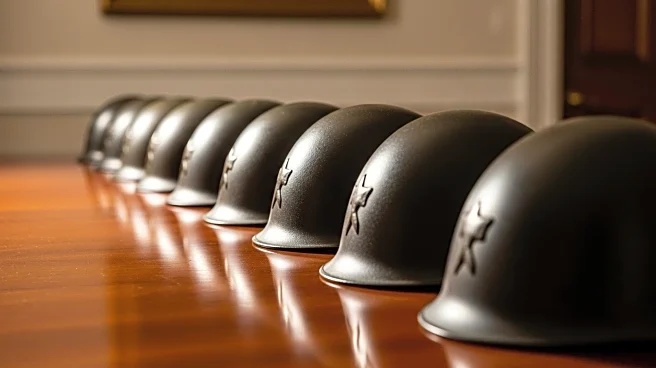What's Happening?
The deployment of National Guard soldiers in Washington D.C., particularly in areas like Dupont Circle, has sparked concerns about the role of military personnel in civilian spaces. Eric Chastain, a retired Command Sergeant Major, recounts his experience of seeing armed soldiers patrolling the streets and public transport in the capital, reminiscent of military patrols in conflict zones like Baghdad and Syria. Chastain highlights the potential risks of deploying young soldiers, who are trained for battlefield tasks, in urban environments where they may encounter civilians in crisis situations. He emphasizes the importance of trust between the military and civilians, which could be jeopardized by such deployments.
Why It's Important?
The presence of armed National Guard soldiers in civilian areas raises significant questions about the militarization of public spaces and the potential erosion of civil-military trust. This deployment could lead to increased tensions and misunderstandings between soldiers and civilians, especially in situations requiring de-escalation skills that soldiers may not possess. The broader implications include the normalization of military presence in civilian life, which could undermine democratic principles and the perception of the military as protectors rather than occupiers. This issue is particularly relevant in the context of recent deployments in major cities like Los Angeles and Washington D.C.
What's Next?
The ongoing deployment of National Guard soldiers in civilian areas may prompt discussions among policymakers, military leaders, and civil society about the appropriate roles and responsibilities of the military in domestic settings. There may be calls for reevaluating training programs to better prepare soldiers for interactions with civilians and for considering alternative approaches to maintaining public order that do not involve military presence. The situation could also lead to increased scrutiny of government decisions regarding the use of military forces in non-combat roles.
Beyond the Headlines
The deployment of military personnel in civilian areas touches on deeper issues of civil liberties, the balance between security and freedom, and the potential shift towards a more militarized society. It raises ethical questions about the use of force and the responsibilities of the military in safeguarding democratic values. Long-term, this trend could influence public perceptions of the military and its role in society, potentially affecting recruitment, public support, and the relationship between the military and civilian leadership.










